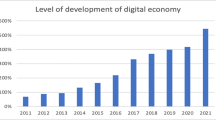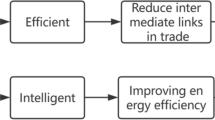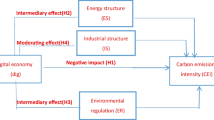Abstract
This study explores the nonlinear relationship between digital service trade and carbon emissions using the data of 42 G20 countries from 2005 to 2021. It is concluded that this relationship appears to be an inverted U-shape. When the digital service trade is inadequate, this exacerbates carbon emissions. Only when the digital service trade is above this point does it become beneficial to environmentally sustainable development. Mediation analyses indicate that the digital service trade increases carbon emissions by increasing emissions from digital infrastructure and decreases them by optimizing the industrial structure and adopting low-carbon technologies. Furthermore, the nonlinear association is moderated by human capital. When human capital is insufficient, it is harder for the digital service trade to curb carbon emissions. Accordingly, this study is helpful to develop the digital service trade and achieving the goals of carbon peak and neutralization and the sustainable growth of the environment.

Similar content being viewed by others
Data availability
The data that support the findings of this study are openly available in UNCTAD STAT at https://unctadstat.unctad.org/wds/ReportFolders/reportFolders.aspx?sCS_ChosenLang=en, World Development Indicators at https://databank.shihang.org/source/world-development-indicators, British Petroleum at https://www.bp.com/en/global/corporate/energy-economics/statistical-review-of-world-energy/downloads.html, and International Energy Agency at https://wds.iea.org/wds/.
Notes
The G20 group includes the European Union, so there are 43 countries. Malta was not included due to missing data.
References
Alesina A, Zhuravskaya E (2011) Segregation and the quality of government in a cross-section of countries. Am Econ Rev 101:1872–1911. https://doi.org/10.1257/aer.101.5.1872
Bankole FO, Osei-Bryson KM, Brown I (2015) The impacts of telecommunications infrastructure and institutional quality on trade efficiency in Africa. Inform Technol Dev 21:29–43. https://doi.org/10.1080/02681102.2013.874324
Baron RM, Kenny DA (1986) The moderator–mediator variable distinction in social psychological research: conceptual, strategic, and statistical considerations. J Pers Soc Psychol 51:1173–1182. https://doi.org/10.5859/kais.2012.21.1.47
Bernard AB, Redding SJ, Schott PK (2007) Comparative advantage and heterogeneous firms. Rev Econ Stud 74:31–66. https://doi.org/10.1111/j.1467-937X.2007.00413.x
Blum BS (2008) Trade, technology, and the rise of the service sector: the effects on US wage inequality. J Int Econ 74:441–458. https://doi.org/10.1016/j.jinteco.2007.06.003
Bown CP, Mavroidis PC, Neeraj RS (2019) Trade rules for the digital economy: charting new waters at the WTO. World Trade Rev 18:S121–S141. https://doi.org/10.1017/S1474745618000423
Brousseau E, Penard T (2007) The economics of digital business models: a framework for analyzing the economics of platforms. Rev Netw Econ 6:81–114. https://doi.org/10.2202/1446-9022.1112
Buckley PJ, Clegg J, Wang C (2007) Is the relationship between inward FDI and spillover effects linear? An empirical examination of the case of China. J Int Bus Stud 38:447–459. https://doi.org/10.1057/palgrave.jibs.8400274
Canning D (1988) A database of world stocks of infrastructure: 1950–95. World Bank Econ Rev 12:529–548. https://doi.org/10.1177/0950017098123007
Che Y, Zhang L (2018) Human capital, technology adoption and firm performance: impacts of China’s higher education expansion in the late 1990s. Econ J 614:75–105. https://doi.org/10.1111/ecoj.12524
Chen F, Jiang G, Kitila GM (2021) Trade openness and CO2 emissions: the heterogeneous and mediating effects for the Belt and Road countries. Sustainability 13:1958. https://doi.org/10.3390/su13041958
Chen F, Jiang G, Dong K (2022) How do FDI inflows curvilinearly affect carbon emissions? Threshold effects of energy service availability and cleanliness. Aust Econ Pap 61:798–824. https://doi.org/10.1111/1467-8454.12273
Chen W, Kamal F (2016) The impact of information and communication technology adoption on multinational firm boundary decisions. J Int Bus Stud 47:563–576. https://doi.org/10.1057/jibs.2016.6
Chris N, Victoria P (2020) Taxation of digital services under trade agreements. J Int Econ Law 23:1015–1039. https://doi.org/10.1093/jiel/jgaa031
Collins RD, Selin NE, Weck OD, Clark WC (2017) Using inclusive wealth for policy evaluation: application to electricity infrastructure planning in oil-exporting countries. Ecol Econ 133:23–34. https://doi.org/10.2139/ssrn.2782641
Crozet M, Milet E (2017) Should everybody be in services? The effect of servitization on manufacturing firm performance. J Econ Manage Strat 26:820–841. https://doi.org/10.1111/jems.12211
Cui D, Deng Z, Liu Z (2019) China’s non-fossil fuel CO2 emissions from industrial processes. Appl Energy 254:113537. https://doi.org/10.1016/j.apenergy.2019.113537
Dong K, Hochman G, Zhang Y, Sun R, Li H, Liao H (2018) CO2 emissions, economic and population growth, and renewable energy: empirical evidence across regions. Energy Econ 75:180–192. https://doi.org/10.1016/j.eneco.2018.08.017
Dong K, Dong X, Dong C (2019) Determinants of the global and regional CO2 emissions: what causes what and where? Appl Econ 51:5031–5044. https://doi.org/10.1080/00036846.2019.1606410
Dong K, Dong X, Ren X (2020) Can expanding natural gas infrastructure mitigate CO2 emissions? Analysis of heterogeneous and mediation effects for China. Energy Econ 90:104830. https://doi.org/10.1016/j.eneco.2020.104830
Du AY, Geng X, Gopal RD, Ramesh R, Whinston AB (2008) Topographically discounted Internet infrastructure resources: a panel study and econometric analysis. Inform Technol Manag 9:135–146. https://doi.org/10.1007/s10799-007-0034-6
Eheliyagoda D, Li J, Geng Y, Zeng X (2022) The role of China’s aluminum recycling on sustainable resource and emission pathways. Resour Pol 76:102552. https://doi.org/10.1016/j.resourpol.2022.102552
Feng R, Shen C, Huang L, Tang X (2022) Does trade in services improve carbon efficiency?—analysis based on International panel data. Technol Forecast Soc 174:121298. https://doi.org/10.1016/j.techfore.2021.121298
Fessler P, Silgoner M, Weber R (2019) Financial knowledge, attitude and behavior: evidence from the Austrian survey of financial literacy. Empirica 47:9290947. https://doi.org/10.1007/s10663-019-09465-2
Fisher-Vanden K, Jefferson GH, Ma J, Xu J (2006) Technology development and energy productivity in China. Energy Econ 28:690–705. https://doi.org/10.1016/j.eneco.2006.05.006
Gao H (2018) Digital or trade? The contrasting approaches of China and US to digital trade. J Int Econ Law 21:297–321. https://doi.org/10.1093/jiel/jgy015
Gomez YR, Hernandze RC, Guerrero JE, Mejia-Ospino E (2018) FTIR-PAS coupled to partial least squares for prediction of ash content, volatile matter, fixed carbon and calorific value of coal. Fuel 226:536–544. https://doi.org/10.1016/j.fuel.2018.04.040
Gnangnon SK (2020) Effect of the Internet on services export diversification. J Econ Integr 35:519–558. https://doi.org/10.11130/jei.2020.35.3.519
Grigorescu A, Pelinescu E, Ion AE, Dutcas MF (2021) Human capital in digital economy: an empirical analysis of central and eastern European countries from the European Union. Sustainability 13:2020. https://doi.org/10.3390/su13042020
Han J, Jiang R, Sun Y (2021) Digital service trade and carbon emissions—empirical research based on 50 countries. Int Bus 6:34–49. https://doi.org/10.13509/j.cnki.ib.2021.06.003
Hayashi T, Ohsawa Y (2020) The acceptability of tools for the data marketplace among firms using market research online communities. Procedia Comput Sci 176:1613–1620. https://doi.org/10.1016/j.procs.2020.09.184
He Y, Xing Y, Zeng X, Ji Y, Hou H, Zhang Y, Zhu Z (2022) Factors influencing carbon emissions from China’s electricity industry: analysis using the combination of LMDI and K-means clustering. Environ Impact Asses 93:106724. https://doi.org/10.1016/j.eiar.2021.106724
Heddeghem WV, Lambert S, Lannoo B, Colle D, Pickavet M, Demeester P (2014) Trends in worldwide ict electricity consumption from 2007 to 2012. Comput Commun 50:64–76. https://doi.org/10.1016/j.comcom.2014.02.008
Hiete M, Berner U, Richter O (2001) Calculation of global carbon dioxide emissions: review of emission factors and a new approach taking fuel quality into consideration. Global Biogeochem Cy 15:169–181. https://doi.org/10.1029/2000GB001261
Honma S, Yoshida Y (2020) An empirical investigation of the balance of embodied emission in trade: industry structure and emission abatement. Econ Modell 92:277–294. https://doi.org/10.1016/j.econmod.2020.01.008
Hu J, Huang Q, Chen X (2020) Environmental regulation, innovation quality and firms’ competitivity-quasi-natural experiment based on China’s carbon emissions trading pilot. Econ Res 33:3307–3333. https://doi.org/10.1080/1331677X.2020.1771745
Hu MC (2012) Technological innovation capabilities in the thin film transistor-liquid crystal display industries of Japan, Korea, and Taiwan. Res Policy 41:541–555 (in Chinese)
Huang H, Yu Y, Zhang S (2019) Internet development and productivity growth in manufacturing industry: internal mechanism and china experiences. China Ind Econ 8:5–23. https://doi.org/10.19581/j.cnki.ciejournal.2019.08.001
Huang J (2017) Comparison of E-commerce regulations in Chinese and American FTAs: converging approaches, diverging contents, and polycentric directions? Netherlands Int Law Rev 64:309–337. https://doi.org/10.1007/s40802-017-0094-1
Huang J, An L, Peng W, Guo L (2023) Identifying the role of green financial development played in carbon intensity: evidence from China. J Clean Prod 408:136943. https://doi.org/10.1016/j.jclepro.2023.136943
Huang J, Berhe MW, Dossou TAM, Pan XM (2022) The heterogeneous impacts of Sino-African trade relations on carbon intensity in Africa. J Environ Manage 15:115233. https://doi.org/10.1016/j.jenvman.2022.115233
Huang J, Li X, Wang Y, Lei H (2021) The effect of energy patents on China’s carbon emissions: evidence from the STIRPAT model. Technol Forecast Soc 173:121110. https://doi.org/10.1016/j.techfore.2021.121110
Huang R, Chen G, Lv G, Malik A, Xie X (2020) The effect of technology spillover on CO2 emissions embodied in China-Australia trade. Energy Policy 144:111544. https://doi.org/10.1016/j.enpol.2020.111544
Huang Y, Porter AL, Cunningham SW, Robinson DKR, Liu J, Zhu D (2018) A technology delivery system for characterizing the supply side of technology emergence: illustrated for big data & analytics. Technol Forecast Soc 130:165–176. https://doi.org/10.1016/j.techfore.2017.09.012
Jafari-Sadeghi V, Garcia-Perez A, Candelo E, Couturier J (2021) Exploring the impact of digital transformation on technology entrepreneurship and technological market expansion: the role of technology readiness, exploration and exploitation. J Bus Res 124:100–111. https://doi.org/10.1016/j.jbusres.2020.11.020
Janow ME, Mavroidis PC (2019) Digital trade, E-commerce, the WTO and regional frameworks. World Trade Rev 4:1–7. https://doi.org/10.1017/S1474745618000526
Ketteni E, Kottaridi C, Mamuneas TP (2015) Information and communication technology and foreign direct investment: interactions and contributions to economic growth. Empir Econ 48:1525–1539. https://doi.org/10.1007/s00181-014-0839-1
Kim TY, Dekker R, Heij C (2017) Cross-border electronic commerce: distance effects and express delivery in European Union markets. Int J Electron Commer 21:184–218. https://doi.org/10.1080/10864415.2016.1234283
Kline P, Rose EK, Walters CR (2022) Systemic discrimination among large U.S. employers. Q J Econ 137:1963–2036. https://doi.org/10.1093/qje/qjac024
Kneller R, Timmis J (2016) ICT and exporting: the effects of broadband on the extensive margin of business service exports. Rev Int Econ 24:757–796. https://doi.org/10.1111/rioe.12237
Knudsen ES, Lien LB, Timmermans B, Belik I, Pandey S (2021) Stability in turbulent times? The effect of digitalization on the sustainability of competitive advantage. J Bus Res 128:360–369. https://doi.org/10.1016/j.jbusres.2021.02.008
Lee J, Berente N (2013) Digital innovation and the division of innovative labor: digital controls in the automotive industry. Oper Res 21:23–47. https://doi.org/10.2307/23252316
Liddle B (2018) Consumption-based accounting and the trade-carbon emissions nexus. Energy Econ 69:71–78. https://doi.org/10.1287/ORSC.1110.0707
Marel E, Ferracane MF (2021) Do data policy restrictions inhibit trade in services? Rev World Econ 4:1–50. https://doi.org/10.2139/ssrn.3384005
Mata E, Kalagasidis AS, Johnsson F (2013) Energy usage and technical potential for energy saving measures in the Swedish residential building stock. Energ Policy 55:404–414. https://doi.org/10.1016/j.enpol.2012.12.023
Meijers H (2014) Does the Internet generate economic growth, international trade, or both? Int Econ Econ Pol 11:137–163. https://doi.org/10.1007/s10368-013-0251-x
Mi Z, Zheng J, Meng J, Zheng H, Li X, Coffman D, Guan D (2019) Carbon emissions of cities from a consumption-based perspective. Appl Energy 235:509–518. https://doi.org/10.1016/j.apenergy.2018.10.137
Mira B, Rodrigo P (2020) Digital trade provisions in preferential trade agreements: introducing a new dataset. J Int Econ Law 1:27–43. https://doi.org/10.1093/jiel/jgz044
Mma B, Xin MC, Wca B, Wei CD (2019) Carbon-dioxide mitigation in the residential building sector: a household scale-based assessment. Energy Convers Manag 198:111915. https://doi.org/10.1016/j.enconman.2019.111915
Modol JR, Eaton B (2021) Digital infrastructure evolution as generative entrenchment: the formation of a core–periphery structure. J Inf Technol 36:342–364. https://doi.org/10.1177/02683962211013362
Navarro-Pabsdorf RM, Martínez-Alcalá C, Moral-Pajares E (2020) Can international trade help Africa’s least developed countries achieve SDG-1? Sustainability 12:4470. https://doi.org/10.3390/su12114470
Ozturk I, Uddin GS (2015) Causality among carbon emissions, energy consumption and growth India. Econ Res 25:752–775. https://doi.org/10.1080/1331677X.2012.11517532
Paramati SR, Mo D, Gupta R (2017) The effects of stock market growth and renewable energy use on CO2 emissions: evidence from G20 countries. Energy Econ 66:360–371. https://doi.org/10.1016/j.eneco.2017.06.025
Payne E (2013) The relationship between international financial reporting standards, carbon emissions, and R&D expenditures: evidence from European manufacturing firms. Ecol Econ 88:57–66. https://doi.org/10.1016/j.ecolecon.2012.12.024
Pomfret R (2020) Global production networks, new trade technologies and the challenge for international institutions. Foreign Trade Rev 55:21–41. https://doi.org/10.1177/0015732519886781
Porter AL, Cunningham SW, Sanz A (2015) Advancing the forecasting innovation pathways approach: hybrid and electric vehicles case. Int J Technol Manage 69:275–300
Potluri SR, Sridhar V, Rao S (2020) Effects of data localization on digital trade: an agent-based modeling approach. Telecommun Policy 44:102022. https://doi.org/10.1016/j.telpol.2020.102022
Qu S, Shi D, Yang D (2022) Carbon emissions of China’s digital economy: calculations and trend outlook. Chin J Popul Resour 32:11–21 (in Chinese)
Rahman MM (2017) Do population density, economic growth, energy use and exports adversely affect environmental quality in Asian populous countries? Renew Sust Energ Rev 77:506–514. https://doi.org/10.1016/j.rser.2017.04.041
Ren S, Hao Y, Xu L, Wu H, Ba N (2021) Digitalization and energy: how does Internet development affect China’s energy consumption? Energy Econ 98:105220. https://doi.org/10.1016/j.chieco.2014.01.003
Sadorsky P (2014) The effect of urbanization on CO2 emissions in emerging economies. Energy Econ 41:147–153. https://doi.org/10.1016/j.eneco.2013.11.007
Shahbaz M, Khan S, Tahir MI (2013) The dynamic links between energy consumption, economic growth, financial development and trade in China: fresh evidence from multivariate framework analysis. Energy Econ 40:8–21. https://doi.org/10.1016/j.eneco.2013.06.006
Shahbaz M, Benkraiem R, Miloudi A, Lahiani A (2017) Production function with electricity consumption and policy implications in Portugal. Energy Policy 110:588–599. https://doi.org/10.1016/j.enpol.2017.08.056
Strange R, Zucchella A (2017) Industry 4.0, global value chains and international business. Multinatl Bus Rev 25:174–184. https://doi.org/10.1108/MBR-05-2017-0028
Tang C, Xu Y, Hao Y, Wu H, Xue Y (2021) What is the role of telecommunications infrastructure construction in green technology innovation? A firm-level analysis for China. Energy Econ 103:105576. https://doi.org/10.1016/j.eneco.2021.105576
Toader E, Firtescu B, Roman A, Anton S (2018) Impact of information and communication technology infrastructure on economic growth: an empirical assessment for the EU countries. Sustainability 10:3750. https://doi.org/10.3390/su10103750
Wcllenius B, Braga C, Qiang ZW (2000) Investment and growth of the information infrastructure summary results of a global survey. Telecommun Policy 24:639–643. https://doi.org/10.1016/S0308-5961(00)00054-9
Whipple KX, Kirby E, Brocklehurst SH (1999) Geomorphic limits to climate-induced increases in topographic relief. Nature 401:39–43. https://doi.org/10.1038/43375
Wintoki MB, Linck JS, Netter JM (2012) Endogeneity and the dynamics of internal corporate governance. J Financ Econ 105:581–606. https://doi.org/10.1016/j.jfineco.2012.03.005
Wolfe R (2019) Learning about digital trade: privacy and E-commerce in CETA and TPP. World Trade Rev 18:S63–S84. https://doi.org/10.1017/S1474745618000435
Wu X, Majeed A, Vasbieva DG, Yameogo CEW, Hussain N (2021) Natural resources abundance, economic globalization, and carbon emissions: advancing sustainable development agenda. Sustain Dev 29:1037–1048. https://doi.org/10.1002/sd.2192
Yang Z, Fan M, Shao S, Yang L (2017) Does carbon intensity constraint policy improve industrial green production performance in China? A quasi-DID analysis. Energy Econ 68:271–282
Yushkova E (2014) Impact of ICT on trade in different technology groups: analysis and implications. Int Econ Econ Pol 11:165–177. https://doi.org/10.1007/s10368-013-0264-5
Zhang S, Collins AR, Etienne XL, Ding R (2021) The environmental effects of international trade in China: measuring the mediating effects of technology spillovers of import trade on industrial air pollution. Sustainability 13:6895. https://doi.org/10.3390/su13126895
Zhang Y, Zhang S (2018) The impacts of GDP, trade structure, exchange rate and FDI inflows on China’s carbon emissions. Energy Policy 120:347–353. https://doi.org/10.1016/j.enpol.2018.05.056
Zhao L, Cao C, Li Y, Li Y (2022) Determinants of the digital outcome divide in E-learning between rural and urban students: empirical evidence from the COVID-19 pandemic based on capital theory. Comput Hum Behav 130:107177. https://doi.org/10.1016/j.chb.2021.107177
Zoundi Z (2016) CO2 emissions, renewable energy and the environmental Kuznets curve, a panel cointegration approach. Renew Sust Energ Rev 72:1067–1075. https://doi.org/10.1016/j.rser.2016.10.018
Funding
This work was funded by the Fundamental Research Funds for the Central Universities in University of International Business and Economics (Grant No. 23YB02).
Author information
Authors and Affiliations
Contributions
Conceptualization: Fuzhong Chen; methodology: Guohai Jiang; formal analysis and investigation: Guohai Jiang; writing — original draft preparation: Guohai Jiang; writing — review and editing: Fuzhong Chen; funding acquisition: Fuzhong Chen; resources: Guohai Jiang; supervision: Fuzhong Chen.
Corresponding author
Ethics declarations
Ethical approval
Not applicable.
Consent to participate
Not applicable.
Consent for publication
Not applicable.
Competing interests
The authors declare no competing interests.
Additional information
Responsible Editor: Ilhan Ozturk
Publisher's Note
Springer Nature remains neutral with regard to jurisdictional claims in published maps and institutional affiliations.
Rights and permissions
Springer Nature or its licensor (e.g. a society or other partner) holds exclusive rights to this article under a publishing agreement with the author(s) or other rightsholder(s); author self-archiving of the accepted manuscript version of this article is solely governed by the terms of such publishing agreement and applicable law.
About this article
Cite this article
Chen, F., Jiang, G. How does the digital service trade nonlinearly affect carbon emissions? Empirical evidence from G20 countries. Environ Sci Pollut Res 30, 123022–123038 (2023). https://doi.org/10.1007/s11356-023-31005-6
Received:
Accepted:
Published:
Issue Date:
DOI: https://doi.org/10.1007/s11356-023-31005-6
Keywords
- Digital service trade
- Carbon emissions
- Human capital
- Mediation analysis
- Moderation analysis
- Nonlinear framework
- Sustainable development




